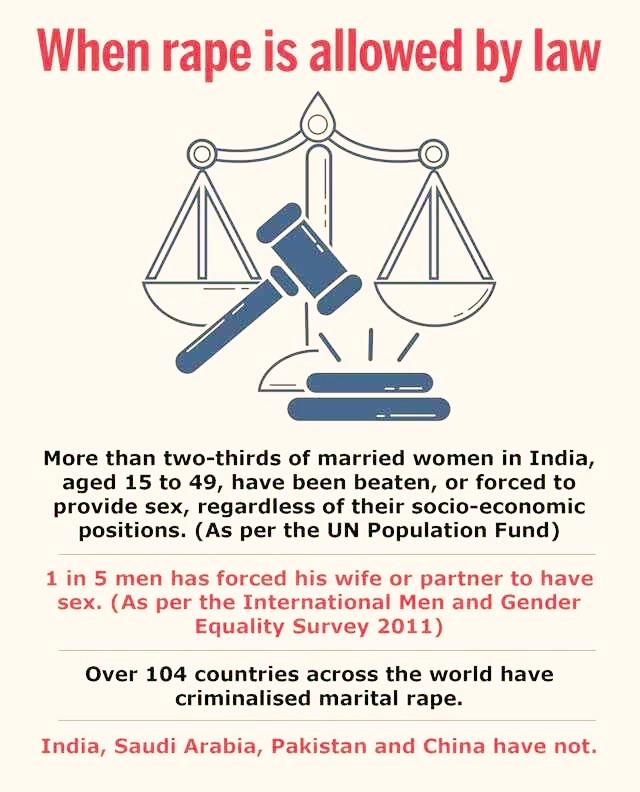Marital Rape: Court is listening, Centre & Kejriwal govt have spoken. You need to speak up, because your silence also speaks
It is a crime that occurs in our streets, in our towns every night. The problem is that the law does not consider it a crime. There is a significant section of the populace that defends this crime. It is called Marital Rape – and an appropriate translation does not exist in many vernacular languages. What would you call it in Punjabi? Or do you think Punjabis are such sweet, chaste, civilised people that they do not commit such an act?
![It is a crime that occurs in our streets, in our towns every night. The problem is that the law does not consider it a crime. There is a significant section of the populace that defends this crime. It is called Marital Rape – and an appropriate translation does not exist in many vernacular languages. What would you call it in Punjabi? Or do you think Punjabis are such sweet, chaste, civilised people that they do not commit such an […]](https://www.theworldsikhnews.com/wp-content/uploads/2022/01/Marital-rape-slider-360x266.jpg)
Punjab is no different from the rest of the country when it comes to rage against the crime of rape. Endless Punjabis have shouted to demand death for rape or even castration. But the same Punjabis are evincing little interest now that India is discussing Marital Rape law.
The Delhi High Court is now listening to a clutch of petitions on the issue. The Centre has tendered its opinion – asking the court to not make any change in the law. The Arvind Kejriwal Delhi government has also proffered similar wisdom. Congress party leader Rahul Gandhi has waded into the debate, taking a strong stance that the law needed to be changed and the impunity bestowed upon men by the act of marriage must not be allowed to continue.
The issue has hardly figured in the ongoing political conversation that has gripped Punjab wherein all political parties are claiming to have a special soft corner for women, ready to send hard cash their way.
Talking Politics That Goes Right Into Your Bedroom – Beyond Channi-Sidhu-Bhagwant Mann shenanigans. Ace journalist and anchor SP Singh in conversation with poet, academic and activist, Monica Kumar and Punjabi University Research scholar and expert on Punjabi folklore and psyche, Dr Sarabjit Kaur.
In this episode of “Daleel with SP Singh,” the host raises a question: “Why is Marital Rape not a burning political issue?”
Marital rape is defined as the act of forcing one’s spouse into having sex without proper consent. You do it to a woman – against her will, without her consent – you will be a rapist. You do it to your own wife – against her will, without her consent – you will not be a rapist.

That’s the law: An unjust but common way in which men degrade and disempower their wives.
In more than 100 countries, you will be considered a rapist if you do it. But not in India. India got the law from its colonial masters via the Indian Penal Code in 1860 but they got rid of the notion in 1991. We still exempt men from such behaviour.
The exception in Section 375 bestows the legal right upon men to rape their wives.

The UN Committee on Elimination of Discrimination Against Women (CEDAW) has beseeched the Indian government to criminalize marital rape. Set up the post-Nirbhaya tragedy, the Justice JS Verma committee had also recommended the same. Women rights activists have been demanding it for so long.
But law continues to deny women autonomy or agency over their bodies. In India, under Section 375, marriage is a licence for husbands to forcibly rape their wives with impunity.

Remember: rape is rape. What is rape in Canada or Australia cannot be a non-rape in India. Punjabis eager to go to Canada or Australia must know that if one brother is in a foreign country and the other is in India, and both treat their wives in the same way, then, under the present law, the brother in Canada or Australia will be called a rapist, while the one in India will have the right to rape his wife.
Have you made peace with this situation, or will you join the debate? Start talking – to your spouse, to your friends, to your neighbours. Break the silence. Shatter the taboo. Speak up. We cannot be a lesser society in the bedroom.
More importantly, ask yourself: Is your wife living with a rapist?
It’s a tough question. As of now, it’s a moral question. This debate wants to make it a legal question.
